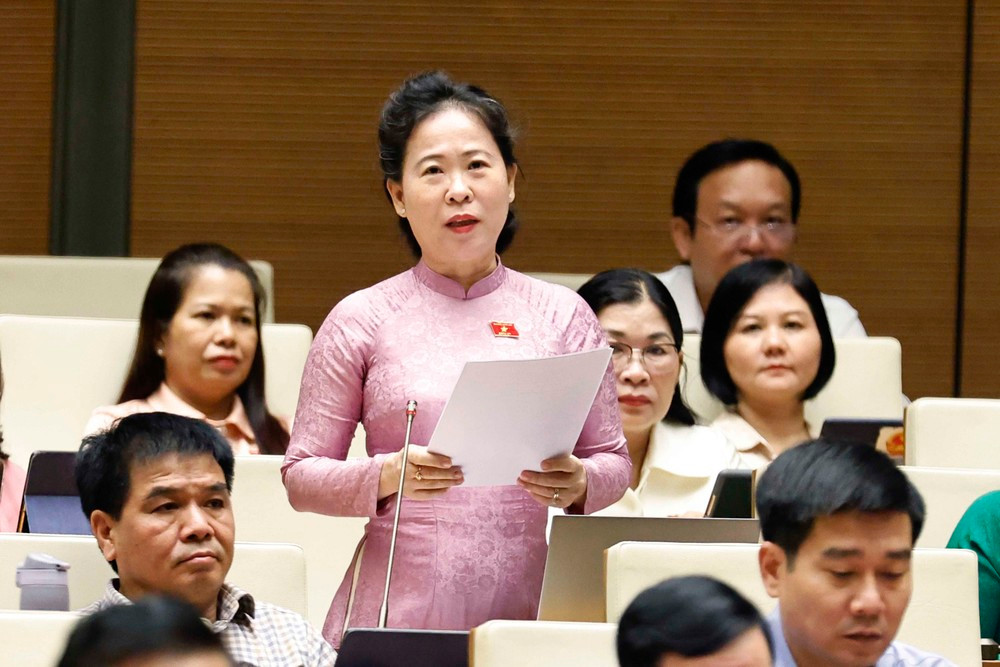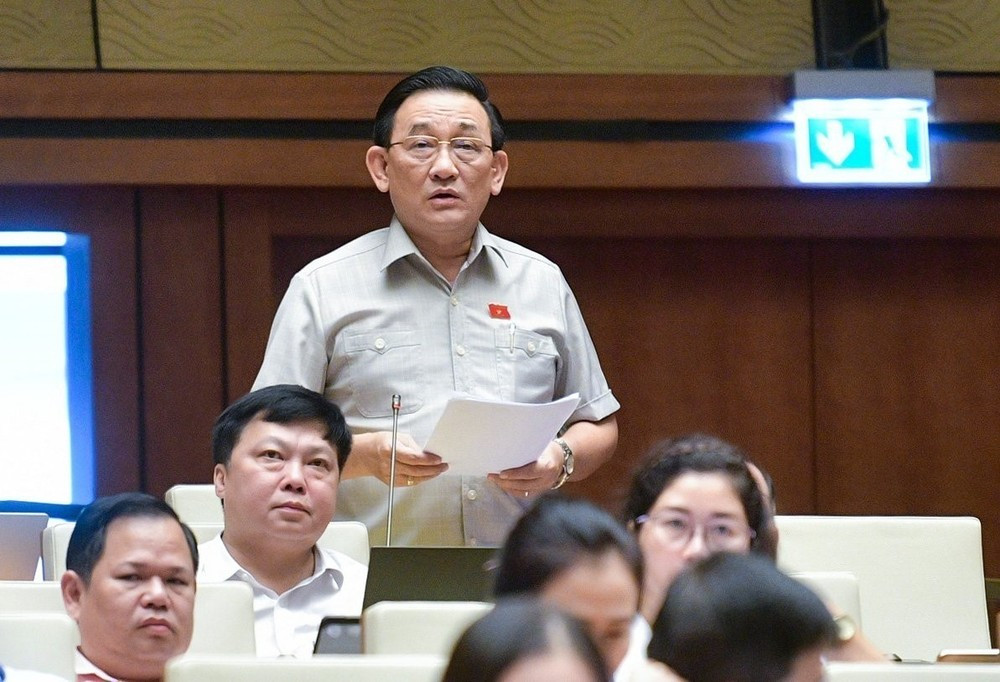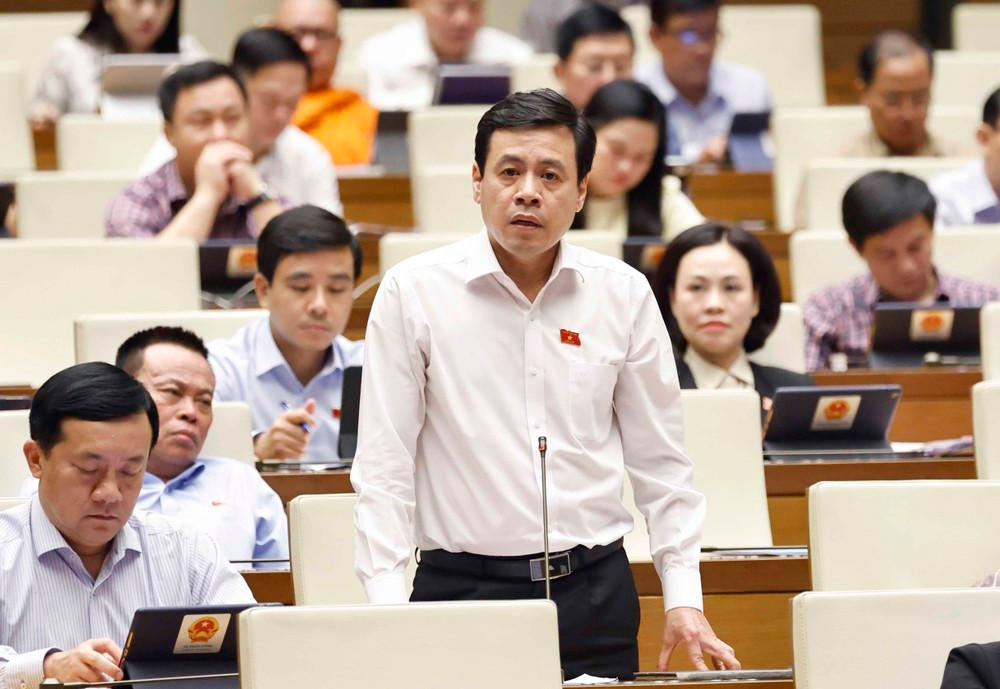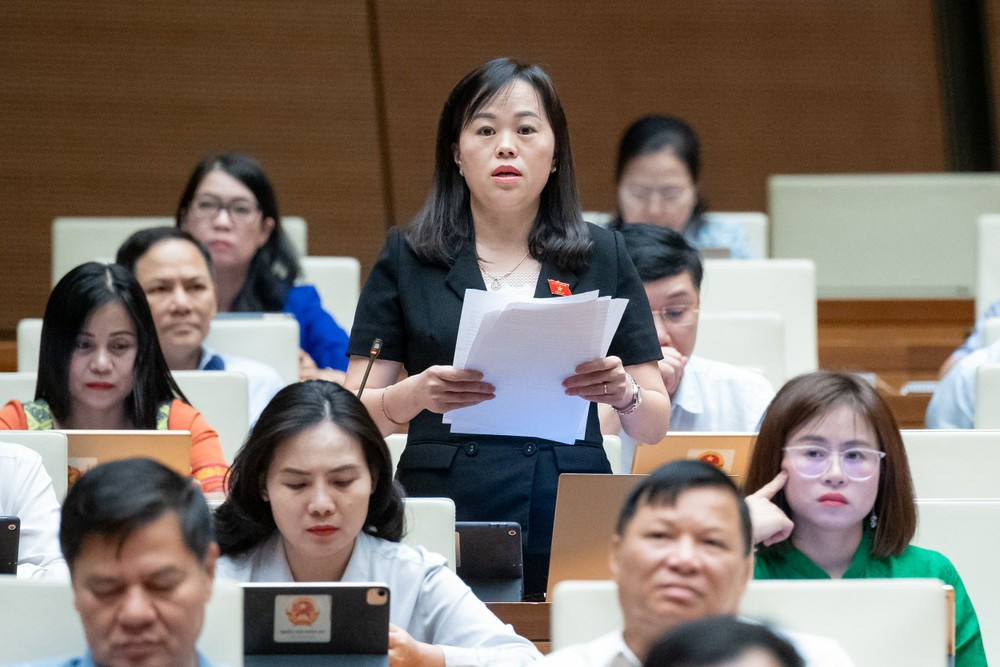With the new regulation that "fertilizer" must be subject to a 5% tax rate as in the draft Law on Value Added (amended), many National Assembly deputies are concerned that farmers will have to "bear great pressure".
Changing fertilizer products from being tax-free to being taxed at 5% will affect millions of farming households and the competitiveness of Vietnamese agriculture.
This is the concern of many National Assembly deputies at the discussion session in the hall about the draft Law on Value Added Tax (amended) that took place this afternoon, June 24. Most opinions disagreed with the fact that “fertilizer” must be subject to a tax rate of 5% as in the draft Law.
Delegate To Ai Vang, National Assembly Delegation of Soc Trang province shared that through the meetings with voters of the National Assembly Delegation of Soc Trang, the delegates in the delegation have received the thoughts, wishes and recommendations of voters related to the investment costs for each cultivation period including fertilizer prices, pesticide prices, gasoline prices, labor costs, and transportation costs that have increased many times. The conflict between agricultural product prices and fertilizer prices that has lasted for a long time has always been a hot issue in Vietnamese agriculture.
Therefore, the delegate recommended that the National Assembly consider amending the Law on Value Added Tax in the direction that fertilizers are subject to a 0% VAT rate. "If the Law still maintains 5% for fertilizers, farmers will have to spend about 6,000 billion VND. If the draft Law applies a 0% VAT to fertilizers, about 2,000 billion VND, instead of being added to the state budget revenue, will be used to support businesses and farmers. Thus, farmers will significantly reduce input costs," the delegate said.

According to delegate To Ai Vang, the National Assembly and the Government should choose what is good for farmers to clearly demonstrate the policies that will be legalized. Vietnam is one of the five countries most affected by climate change. According to trends and recommendations, the inevitable direction of Vietnamese agriculture today is to increase the production and use of organic fertilizers. Besides the complicated price fluctuations of inorganic fertilizers, the organic fertilizer market is expected to grow at a double rate. Therefore, the delegate found that if the draft Law includes fertilizers as the subject of a 5% tax rate as expected, it will contribute to increasing pressure on farmers in conditions where the agricultural sector is the most vulnerable.
Agreeing with the proposal of the Soc Trang delegate, delegate Tran Quoc Tuan, the National Assembly Delegation of Tra Vinh province, said that it is necessary to have a more thorough survey, assessment and report on the impact of changing fertilizer products from non-taxable to taxable with a tax rate of 5% from both perspectives: impact on the development of the fertilizer production and trading industry, serving agricultural production; impact from the increase in fertilizer prices, how does it affect farmers' income, and how is the competitiveness of agricultural products?
Also supporting the development of organic agriculture, green and clean agriculture, according to delegate Tran Quoc Tuan, the Law needs to classify "fertilizer products" into two groups of goods, namely "chemical fertilizers" and "organic fertilizers", in which special priority is given to exempting value added tax on organic fertilizers as many countries are doing.
“This priority is to help orient and gradually change the habit of using chemical fertilizers to using organic fertilizers, and at the same time gradually shift Vietnam's agricultural production to green and clean agriculture according to the Party and State's policies,” emphasized the Tra Vinh delegate.

According to delegate Tran Anh Tuan, National Assembly Delegation of Ho Chi Minh City, raising the tax rate from 0% to 5% as in the draft Law for some goods that are inputs for agricultural production will reduce the competitiveness of enterprises producing these goods, causing inflationary pressure on consumer goods, affecting people's lives.
“Designing two policies can easily cause conflicts when implementing an expansionary fiscal policy but introducing new taxable subjects, which will reduce the expansionary fiscal policy we are implementing. Therefore, it is necessary to design policies according to a roadmap, especially for agricultural products, which need to recalculate reasonable tax policies. It is possible to include a 0% tax rate instead of 5% as in the draft law so that businesses can deduct taxes, so that output food products will not be under pressure to increase prices while still implementing the expansionary fiscal policy better, more effectively and efficiently,” said delegate Tran Anh Tuan.
In addition, the delegate said that the draft Law has not yet designed a roadmap for implementation, while from now until the end of 2025 we need to continue implementing expansionary fiscal policies because there is still a lot of room. Therefore, it is necessary to design in the direction of assigning the Government to include taxable subjects in accordance with the tax reform roadmap, but there needs to be an implementation time appropriate to the actual situation.

Considering the need to consider applying a 5% tax rate to fertilizers, delegate Khang Thi Mao, National Assembly Delegation of Yen Bai province, said: “According to the current Law on Value Added Tax, fertilizers are not subject to value added tax. Enterprises are not allowed to declare and deduct input value added tax on goods and services, including investment activities and asset purchases for fertilizer production activities, but must calculate it into product costs, causing prices to increase, profits to decrease, and being unfavorable to competition with imported fertilizers; difficulties in capital sources make enterprises not proactive enough in investing and expanding production.”
Delegate Khang Thi Mao suggested that the Government consider not applying the above proposal. Because, according to the delegate, the nature of value added tax is an indirect tax with neutrality and high economic value, which is reflected in two aspects: value added tax is not affected by the business results of the taxpayer, so value added tax is not a factor of production costs, but simply an amount added to the selling price of the service provider; value added tax is not affected by the organization and division of the production and business process.
“Through international experience, when wanting to give incentives to a certain sector, there are two options: put it on the tax-free list or apply a 0% tax rate. In the context of the world and domestic fertilizer markets continuing to increase, I suggest strongly considering applying a 5% tax rate to fertilizers,” the delegate proposed.

Expressing disagreement with the tax rate increase that farmers will have to "bear," delegate Tran Van Lam, National Assembly Delegation of Bac Giang province, emphasized: "Fertilizers, supplies, machinery, specialized equipment for agriculture and offshore fishing vessels should not be transferred to the VAT taxable subjects. If there is a transfer, it should only be put into the 0% taxable subjects. It is necessary to support domestic enterprises producing these products to compete equally with imported products of the same type at home, but this responsibility should not be pushed onto agriculture and farmers, and should not be collected from the poor to pay the rich."
VN (synthesis)